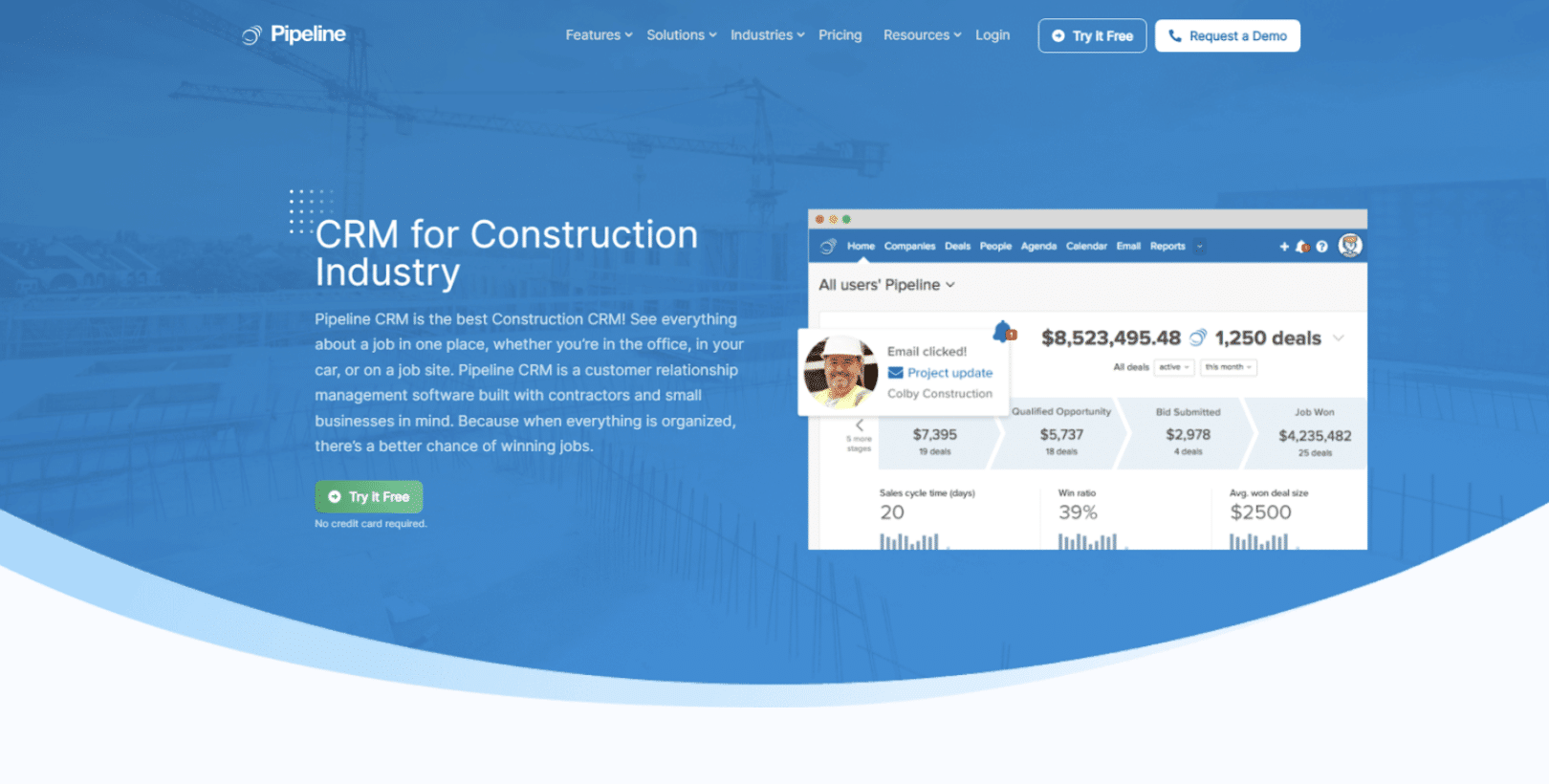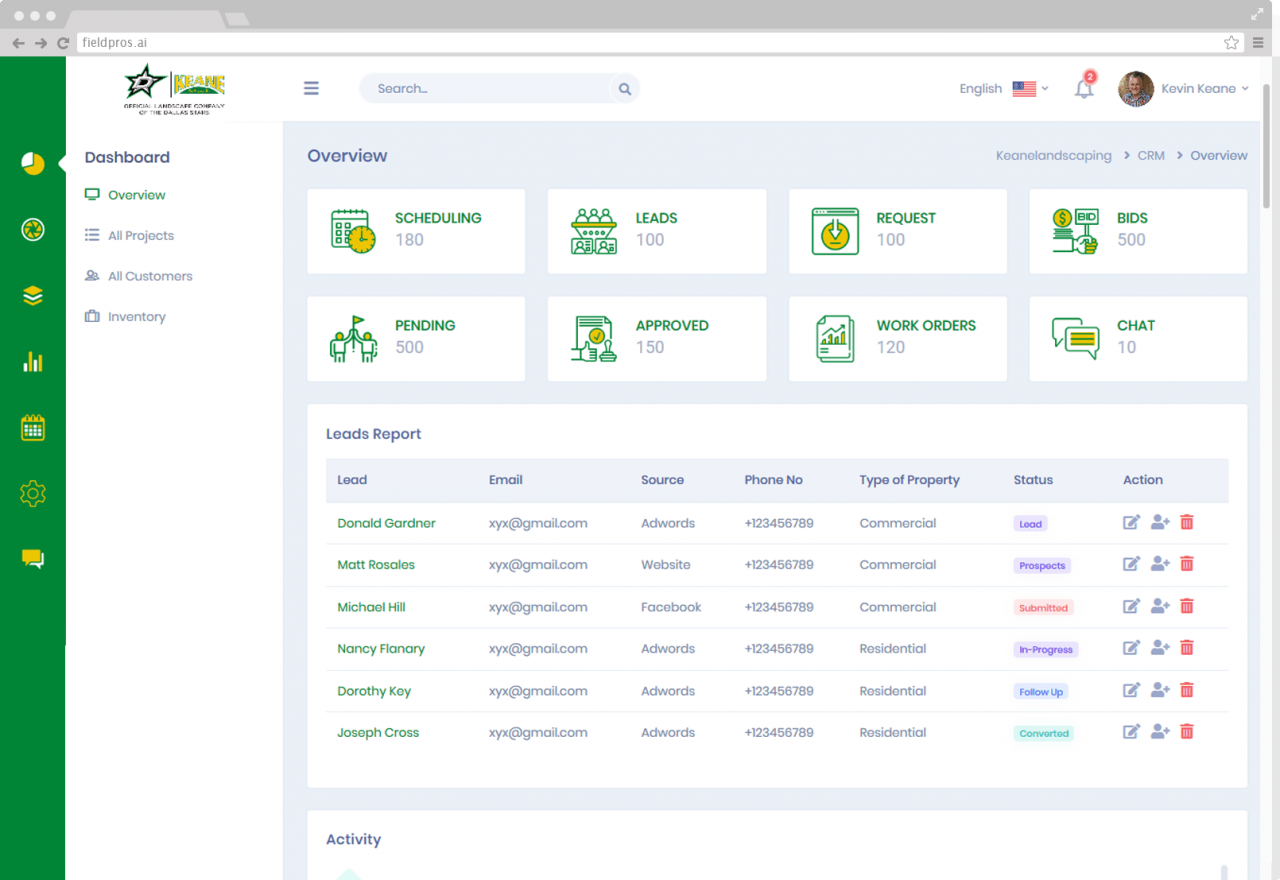Crm for construction company – In the competitive world of construction, leveraging the power of CRM for construction companies can be a game-changer. CRM systems streamline communication, enhance collaboration, and boost efficiency, empowering construction businesses to stay ahead of the curve.
With its robust features tailored specifically for the construction industry, CRM software helps manage projects effectively, track progress seamlessly, and foster strong client relationships.
Introduction
Customer relationship management (CRM) is a powerful tool that can help construction companies improve communication, collaboration, and efficiency. By centralizing customer data and interactions, CRM systems provide a single source of truth for all customer-related information, making it easier for teams to track progress, identify opportunities, and resolve issues.
CRM systems can also help construction companies automate tasks, such as sending out marketing emails or scheduling appointments. This can free up valuable time for employees, allowing them to focus on more strategic initiatives.
Benefits of CRM for Construction Companies
- Improved communication and collaboration
- Increased efficiency
- Automated tasks
- Improved customer service
- Increased sales
Features of a CRM for Construction Companies
A CRM system tailored for construction companies provides a comprehensive suite of features designed to streamline project management, track progress, and enhance communication with clients. These features empower construction businesses to manage their operations more efficiently, improve collaboration, and ultimately deliver exceptional customer service.
Key features of a CRM for construction companies include:
Project Management
- Centralized project tracking: Monitor project progress, timelines, and milestones in real-time.
- Task assignment and collaboration: Assign tasks, track progress, and facilitate seamless collaboration among team members.
- Document management: Store and manage project documents, plans, and specifications in a centralized location.
Client Relationship Management
- Contact management: Maintain detailed profiles of clients, including contact information, project history, and communication preferences.
- Communication tracking: Track all interactions with clients, including emails, phone calls, and site visits.
- Lead management: Capture and nurture leads, track their progress through the sales pipeline, and convert them into paying clients.
Reporting and Analytics
- Project performance analysis: Track project performance metrics, identify bottlenecks, and optimize processes.
- Sales pipeline analysis: Monitor sales pipeline performance, identify trends, and forecast revenue.
- Customer satisfaction analysis: Measure customer satisfaction, identify areas for improvement, and build stronger relationships.
Integration with Other Systems
- Accounting software integration: Integrate with accounting systems to streamline invoicing, payments, and financial reporting.
- Project management software integration: Connect with project management software to enhance project planning, scheduling, and resource allocation.
- Email marketing integration: Integrate with email marketing platforms to automate email campaigns, track results, and nurture leads.
Benefits of Implementing a CRM
Implementing a customer relationship management (CRM) system offers numerous advantages for construction companies. A CRM system can enhance customer relationships, boost sales, and reduce costs, ultimately leading to increased profitability and business growth.
Improved Customer Relationships
A CRM system provides a centralized platform for managing all customer interactions, including communication, scheduling, and support. This enables construction companies to track customer preferences, interactions, and project history, fostering personalized experiences and stronger relationships. By responding promptly to inquiries, resolving issues efficiently, and proactively reaching out to customers, construction companies can build trust and loyalty, leading to repeat business and positive word-of-mouth.
Increased Sales
A CRM system can streamline sales processes, improve lead generation, and enhance sales forecasting. By tracking customer interactions, identifying sales opportunities, and managing sales pipelines, construction companies can prioritize high-potential leads, nurture relationships, and close deals more effectively. Automated marketing campaigns and personalized follow-ups can further increase sales conversion rates.
Reduced Costs, Crm for construction company
A CRM system can automate many administrative tasks, such as scheduling appointments, sending reminders, and generating reports. This automation reduces the need for manual labor, freeing up staff to focus on higher-value activities. Additionally, a CRM system can improve project management by providing real-time visibility into project progress, resource allocation, and billing information.
This enables construction companies to identify potential bottlenecks, optimize resource utilization, and minimize project overruns, resulting in significant cost savings.
Choosing the Right CRM

Selecting the optimal CRM system for a construction company necessitates careful consideration of various factors. Key aspects to evaluate include the company’s size, budgetary constraints, and unique requirements.
Factors to Consider
- Company Size:Smaller companies may benefit from simpler, more affordable CRM solutions, while larger enterprises require comprehensive systems that can handle complex operations.
- Budget:CRM systems vary in cost, so it’s crucial to establish a budget and explore options that align with it.
- Specific Needs:Identify the specific business challenges that a CRM system should address, such as project management, lead generation, or customer service.
- Industry-Specific Features:Consider CRM systems tailored specifically to the construction industry, as they often include industry-specific functionalities and integrations.
- Integration Capabilities:Ensure that the CRM system can seamlessly integrate with other software used by the company, such as accounting, project management, or CAD software.
Implementation and Integration

Implementing a CRM system in a construction company involves several key steps:
1. Planning:Define the goals, objectives, and scope of the CRM implementation. Determine the specific business processes that will be supported by the CRM system.
2. Data migration:Gather and cleanse existing customer data from various sources, such as spreadsheets, databases, and email systems. Prepare the data for import into the CRM system.
3. System configuration:Customize the CRM system to meet the specific needs of the construction company. Configure modules, workflows, and security settings to align with the company’s business processes.
4. User training:Train employees on how to use the CRM system effectively. Provide hands-on training and support to ensure adoption and proficiency.
5. Go-live:Launch the CRM system and monitor its performance. Provide ongoing support and make necessary adjustments to optimize the system’s functionality.
Integration
Integrating a CRM system with other business systems is crucial for seamless data flow and improved efficiency. Key systems to integrate include:
- ERP systems:Synchronize customer data, project information, and financial transactions between the CRM and ERP systems.
- Project management tools:Link CRM data to project schedules, tasks, and resource allocation for better coordination.
- Communication tools:Integrate CRM with email, messaging, and collaboration platforms to facilitate communication with customers and project teams.
Case Studies and Best Practices
To demonstrate the transformative impact of CRM in the construction industry, we present real-world examples of construction companies that have leveraged CRM systems to enhance their operations and achieve remarkable success.
Furthermore, we delve into industry-specific best practices that construction companies can adopt to maximize the benefits of CRM, ensuring optimal performance and business outcomes.
Case Study: ABC Construction
ABC Construction, a leading construction firm, implemented a CRM system to streamline its project management and client communication processes. The system provided a centralized platform for managing project information, including schedules, budgets, and progress updates. By integrating the CRM with their accounting software, ABC Construction gained real-time visibility into project costs and profitability.
Moreover, the CRM’s communication tools facilitated seamless collaboration between project teams, subcontractors, and clients. This enhanced coordination resulted in reduced project delays and improved customer satisfaction.
Future Trends in CRM for Construction
The construction industry is constantly evolving, and so are the CRM solutions that serve it. Emerging trends in CRM technology are shaping the future of CRM in the industry, offering construction companies new opportunities to improve their efficiency, productivity, and profitability.
One of the most significant trends is the rise of artificial intelligence (AI) and machine learning (ML). AI-powered CRM systems can automate tasks such as lead generation, lead qualification, and customer segmentation. They can also provide real-time insights into customer behavior, helping construction companies to better understand their customers and tailor their marketing and sales efforts accordingly.
Cloud-Based CRM Systems
Cloud-based CRM systems are becoming increasingly popular for construction companies. These systems are hosted in the cloud, which means that they can be accessed from anywhere with an internet connection. This makes them ideal for construction companies that have multiple offices or employees who work remotely.
Mobile CRM
Mobile CRM systems are designed to be used on smartphones and tablets. These systems allow construction companies to manage their CRM data on the go. This can be especially useful for construction companies that have employees who are frequently in the field.
Integration with Other Software
CRM systems can be integrated with other software, such as accounting software, project management software, and marketing automation software. This integration can help construction companies to streamline their business processes and improve their overall efficiency.
Data Analytics
Data analytics is becoming increasingly important for construction companies. CRM systems can provide construction companies with valuable insights into their customer data. This data can be used to improve marketing and sales campaigns, identify new opportunities, and make better decisions.
Last Recap: Crm For Construction Company
Embracing CRM for construction companies is a strategic investment that delivers tangible benefits. From improved customer satisfaction to increased sales and reduced costs, CRM empowers construction businesses to thrive in the modern era.
Commonly Asked Questions
What are the key benefits of CRM for construction companies?
CRM systems offer numerous benefits, including improved communication, enhanced collaboration, streamlined project management, increased sales, and reduced costs.
How can CRM help construction companies manage projects more effectively?
CRM software provides tools for project planning, scheduling, tracking progress, and managing resources, enabling construction companies to stay organized and on top of project deliverables.
What are some best practices for implementing CRM in construction companies?
Best practices include defining clear goals, choosing the right CRM system, involving key stakeholders, ensuring data accuracy, and integrating CRM with other business systems.